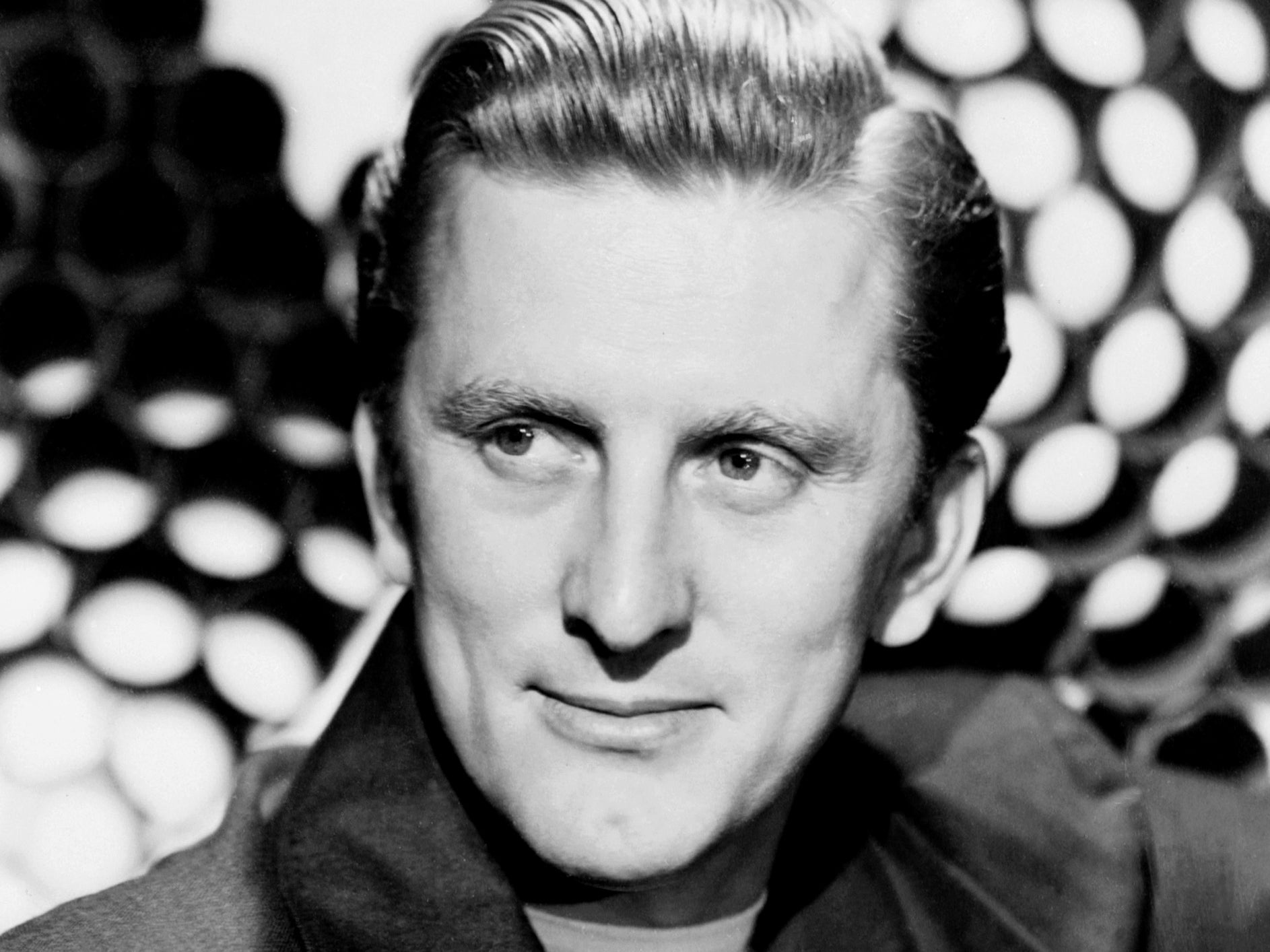Kirk Douglas pushed his way from an impoverished childhood to become one of the world’s biggest movie stars
The Hollywood star – who has died at the age of 103 – excelled at playing dark and troubled figures facing seemingly insurmountable hurdles, writes Geoffrey Macnab

Kirk Douglas was the embodiment of the Hollywood spirit. Cut from the very same cloth as the hustlers and entrepreneurs – the Zukors, Mayers, Warners, Laemmles and Cohns – who had founded the Hollywood studios in the first place, he was Jewish, a ragman’s son who had pushed his way from an impoverished childhood in New York to become one of the world’s biggest movie stars.
Douglas had extraordinary resilience. In the late 1950s and early 1960s, the studio system collapsed around him but he continued to prosper. He had founded his own production company, Bryna Productions, in 1955, and had enough spirit and independence to make his own movies, often in defiance of the studio bosses. Quite apart from his prodigious achievements as an actor, he had an important career as a producer and campaigner. Although he excelled at playing ruthless individualists, he nurtured the careers of many others. He was a key figure in breaking the Hollywood blacklist by insisting that Dalton Trumbo (the former communist who had gone to jail as one of the “Hollywood Ten”) was credited under his real name on Spartacus (1960).
Audiences identified with Douglas because of his defiance. He always seemed to be up against it. Whether as the slave leader in Spartacus, the boxer in his breakthrough film, Champion (1949), the city slicker journalist stuck in small town New Mexico in Ace in the Hole (1951), the First World War French army officer taking on his superiors in Paths of Glory (1957) or the Hollywood star fallen on hard times in Two Weeks in Another Town (1962), Douglas was continually shown on screen facing seemingly insurmountable hurdles. He never capitulated. Many of his characters were unscrupulous and even amoral. He enjoyed playing dark and troubled figures. “Virtue is not photogenic,” he once said.
The actors who have died most in films
Show all 10It is intriguing to watch Douglas in less familiar roles, for example as the lawyer in romantic comedy For Love or Money (1963). The film is intended as a piece of froth, an equivalent to the Doris Day/Rock Hudson films like Pillow Talk (1959) that its director, Michael Gordon, also made. However, Douglas is the same saturnine, brooding figure that he is in his more characteristic roles. It’s not in his nature to lighten up or to lower the intensity. Seeing him here is like watching Marlon Brando in a Bridget Jones film. He has an unsettling effect on the rest of the cast. Unsurprisingly, the film was not well received.
Douglas did his own stunts. He was a college wrestling champion, cocksure, good looking and very athletic. He excelled at playing cowboys, trappers and Vikings in vigorous action movies and westerns. In spite of his humble beginnings, he had an arrogance verging on obnoxiousness about him, both on and off screen. You can understand easily enough why all his former collaborators turned against him in The Bad and the Beautiful (1952), in which he played a young Hollywood producer on the make.
However, the alpha-male persona was tempered with a vulnerability. Whether as Vincent van Gogh wrestling with his inner demons in Lust for Life (1956) or as the cop who can’t hide his misogynistic disgust at his wife and her chequered past in Detective Story (1951), his most memorable screen characters tended to have doubts or even a hint of self-loathing about them
Douglas, who always claimed that his real ambition had been to act on stage, plotted his Hollywood career with guile and ruthlessness. As producer John Houseman, who worked with him on The Bad and the Beautiful and Two Weeks in Another Town, noted of him, early in his career, “his furious drive for fame and recognition coincided with the roles he played”. There was nobody better at portraying characters on the way up. Douglas chose his collaborators very carefully. One reason that his films stand up so well is that they were made by the best directors in Hollywood. He worked with Stanley Kubrick, Billy Wilder, Howard Hawks, Vincente Minnelli, John Frankenheimer and Elia Kazan among others. Once he was established, he would use his box office credentials to enable filmmakers to take on projects that otherwise might have been deemed too risky.
Sustained by a mix of optimism and cussedness, Douglas outlived nearly all his contemporaries, surviving illnesses and catastrophes that would have destroyed weaker men. In one of his autobiographies (he had time for several), he wrote about a weekly game of poker for low stakes he used to play with his Hollywood pals, Frank Sinatra, Jack Lemmon, Gregory Peck and their respective wives. “After Frank died, the game went on. When Gregory Peck died, the game continued. Jack Lemmon died – and it still continues. The other day we played and all the widows were there. I looked across the table at my wife and thought, ‘When I die, this game will still go on.’”
Who knows whether the widows’ poker game will continue without him, but his place as one of the true Hollywood greats has long been assured.
Subscribe to Independent Premium to bookmark this article
Want to bookmark your favourite articles and stories to read or reference later? Start your Independent Premium subscription today.

Join our commenting forum
Join thought-provoking conversations, follow other Independent readers and see their replies